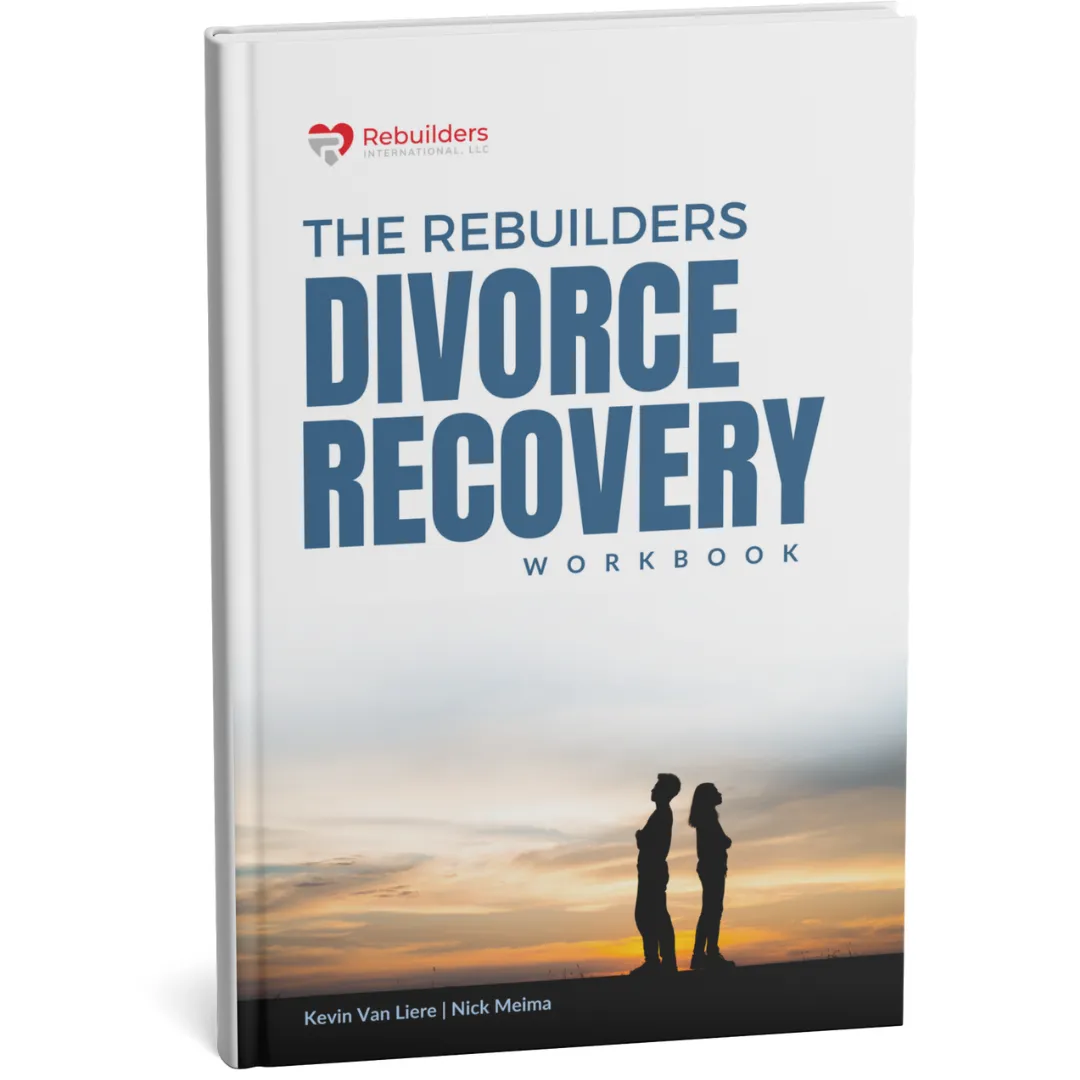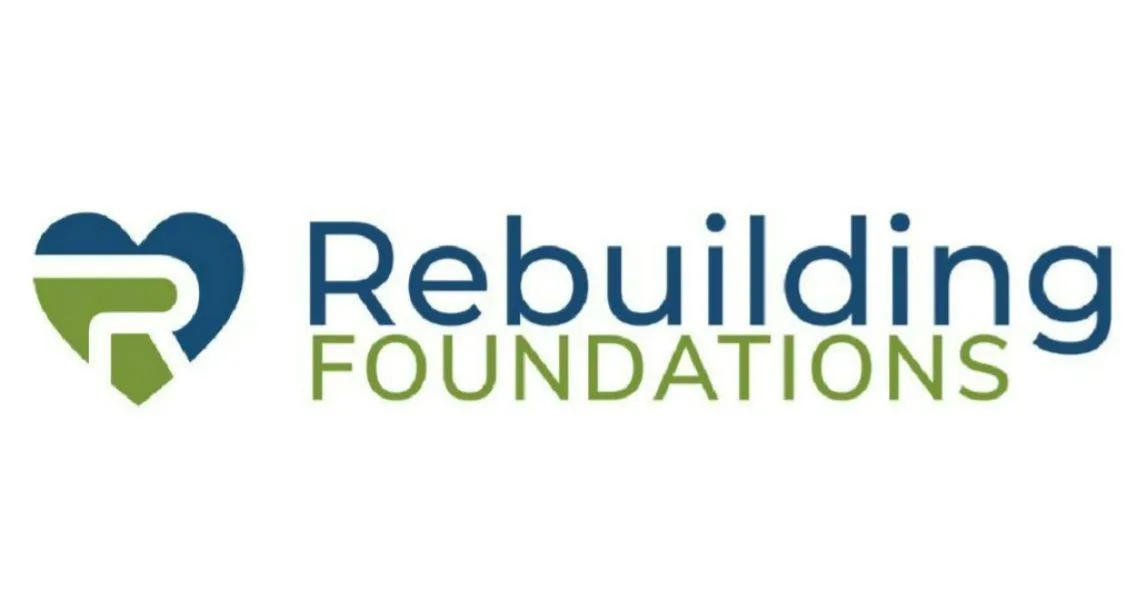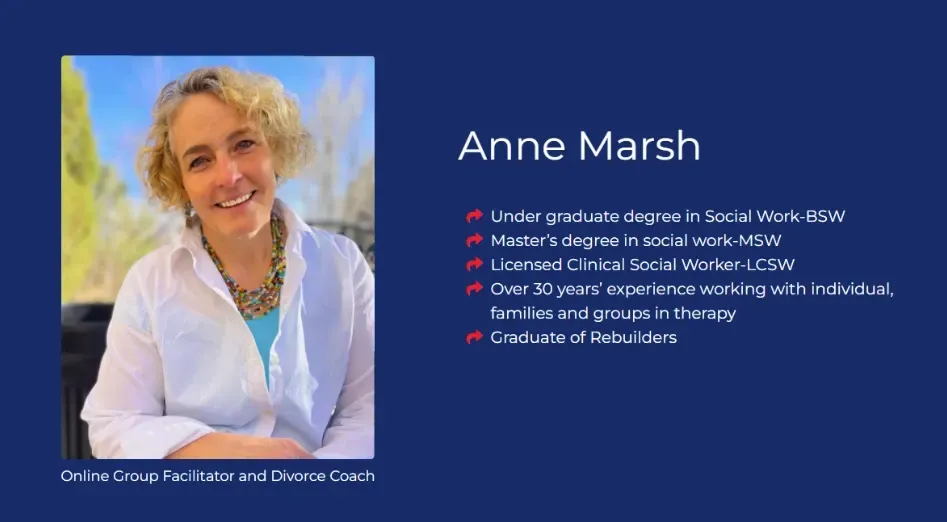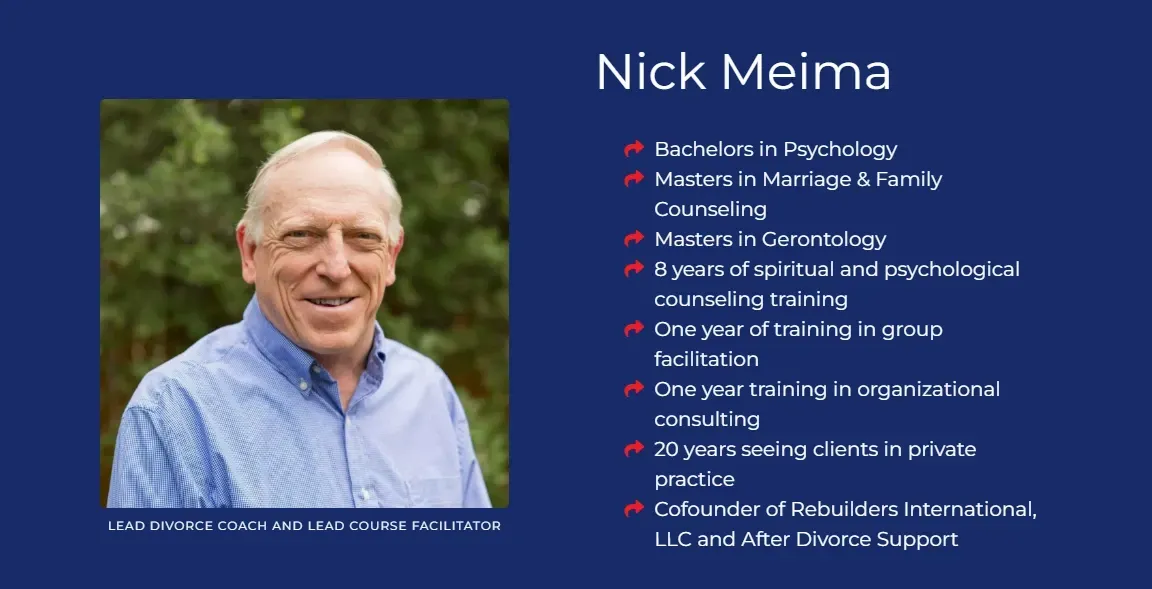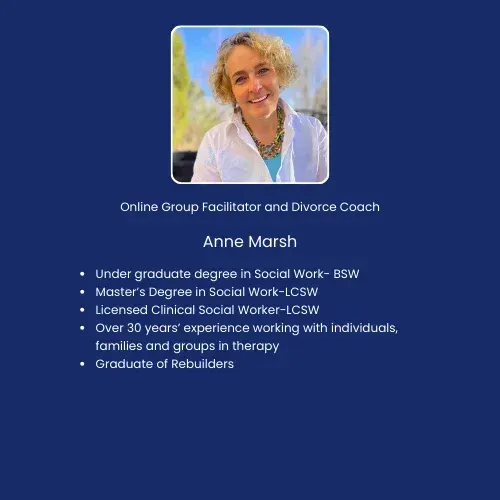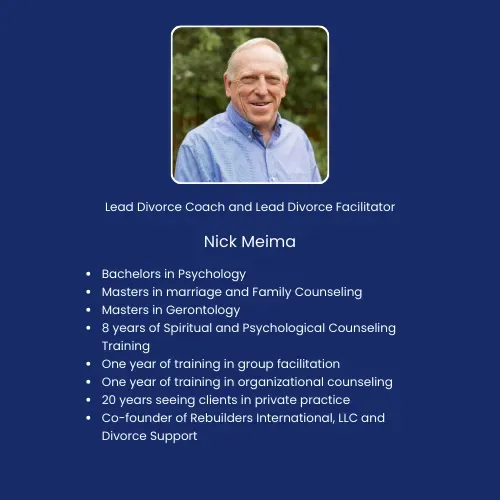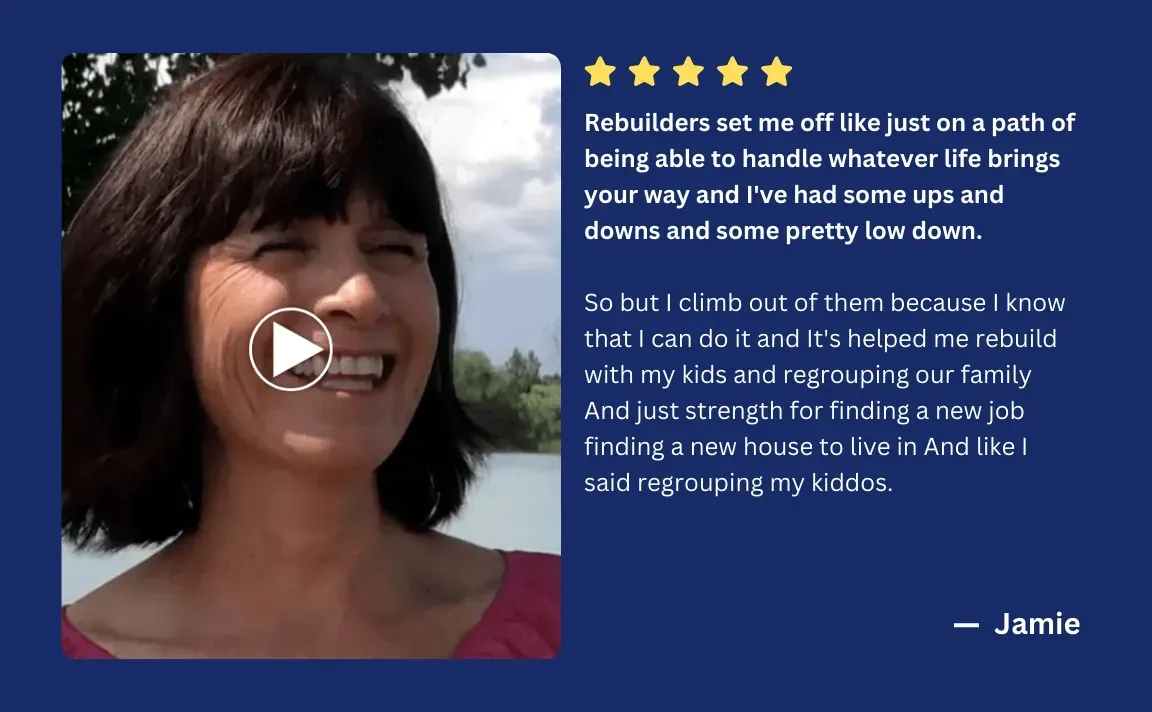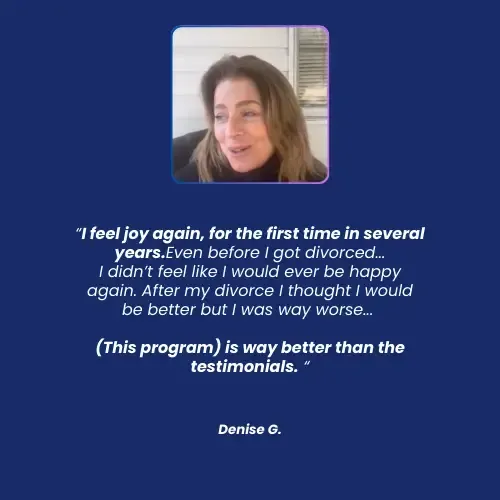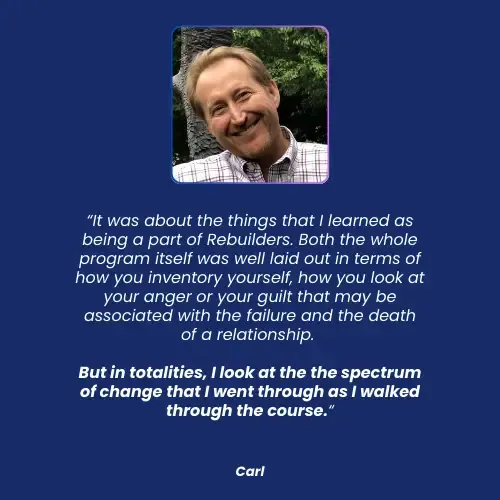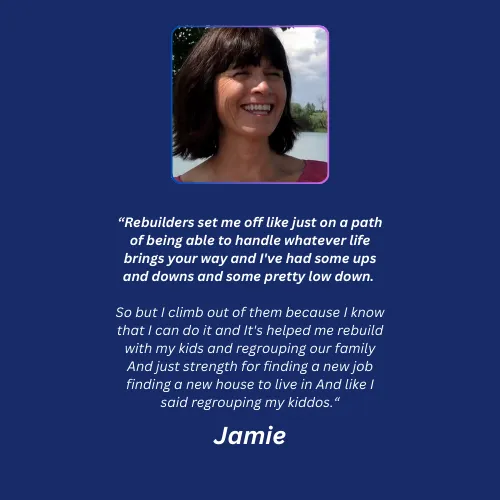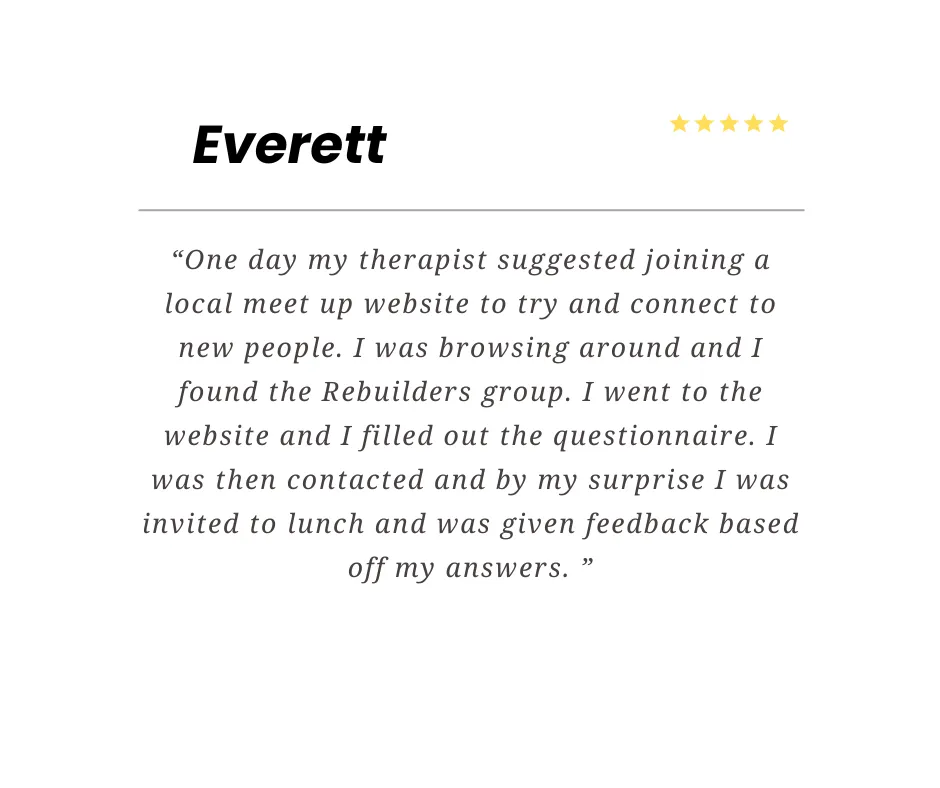FEATURED STORIES...
(Click on the images to open in a new tab)
Welcome to the #1 most comprehensive divorce recovery program in the world. For 40 years.
Is Divorce in your future?
In the Divorce Process?
Divorced?
THERE'S NO CIRCUMSTANCE OR SITUATION THAT WE CAN'T HELP WITH

A program that has been reliably operating
for over 40 years.
97% Success Rate
Don't know where to start?
Your Journey Begins Here

Get an "Emotional Weather Report
Learn how you are doing in 6 key areas, plus get free, personalized training on how YOU can recover best!

Schedule a FREE 30-Minute Consult
Talk with an expert Divorce Coach about your situation, your results, and the best path forward for YOU.

Sign up for an introductory class
Learn more about the Rebuilders programs available to you that will fit your schedule and budget
Take the First Step Here
Our Courses and Services
10-WEEK
GROUP CLASSES
The Most Effective, Efficient and PROVEN System In The World, For Over 40 Years.
Group classes have proven to be the BEST method for recovery when dealing with divorce. Being able to connect with others in a similar situation is SO powerful and important!

Online Workshops
NEXT ONLINE CLASS STARTS:
Monday March 30th at 8pm ET (5pm PT)

Our Online Divorce Recovery Groups are 2 hours long, designed to focus on your healing journey. These Divorce Recovery Online sessions connect you with others in a supportive community, where skilled coaching guides you every step of the way.
In-Person Seminars
Divorce Recovery Workshops are offered in more than 20 locations worldwide, giving you access to in-person sessions.

Local groups are also focused on recovery but they typically focus more on community and making connections locally. Join now to get the support you need!
FIND A SEMINAR NEAR YOU
Monthly Support Group
SECOND TUESDAY NIGHT
of each month
8-9:30pm Eastern (5-6:30 PT)

Our Divorce Group Sessions offer a safe and supportive environment, designed to help you heal and grow with others who understand your journey. Participate in these Divorce Recovery Workshops from the comfort of your own home.
PRIVATE COACHING
Your Situation Is Unique.
You Are Unique.
Group classes are tremendously helpful but we know that people also have some very difficult situations that they are dealing with. When working with a coach One-on-One you can dramatically accelerate the process and get guidance on YOUR situation in a focused, personalized process.
A lot of people try therapy as the deal with divorce. Many find that therapy does not give them the results that they are looking for. Coaching does.

E-COURSES
Do you have a busy schedule or tight budget?
We offer a variety of self paced programs in which you are guided step-by-step. You can focus on a particular area of recovery or get our proven 10 step recovery program. These courses will fit into any schedule and some you can get started for free. All come with a money back guarantee. You also have the option of adding private coaching as well.

4O Years Of Changing People's Lives.

MEET DR. BRUCE FISHER
The founder of the Rebuilders program was Dr. Bruce Fisher (1931-1998). He was born in Iowa but spent most of his adult life in Boulder, Colorado. He was a popular divorce therapist, author, teacher and a Clinical Member of the American Association for Marriage and Family Therapy. As he worked with clients dealing with divorce he realized that traditional therapy didn’t work efficiently.
He began working with his clients in groups and eventually found that there are 19 “steps” that people must work through to effectively “Rebuild” their lives. From this work he wrote the book “Rebuilding When Your Relationship Ends.” We still use this book as a reference in our classes. Since he wrote the book over 30 years ago we have learned a lot and the program has evolved considerably. Now we find that there are more “steps” and that there are some elements that Dr. Fisher wasn’t aware of or misunderstood. However, he still created a powerful foundation for the program that we run today.
This program continues to improve and it works.
We guarantee it.

Don't be alone!
Join us on social media and start your journey to rebuilding
How Our Program Works

Head
Your thinking, mindset, beliefs, and values all influence how you respond to the traumatic experience of divorce. We show you how to step outside of the rumination about the past. Learn to step outside of the normal traps that keep people stuck thinking about the past.

Heart
Many people suppress, depress, or repress their feelings. Divorce brings so many "difficult" feelings. We give you tools to work through them, use them, and feel the "good" feelings again - like HAPPINESS, JOY, AND LOVE.

Identity
In marriages people "lose" themselves. When the marriage ends they don't know who they are as a single person. We help you connect with yourself so that you can be comfortable being alone in your own skin.
Free Divorce Resources
Rebuilders is committed to helping EVERYONE, regardless of their financial situation.
The Program Works Regardless of Your Situation!
Is Divorce in your future?

Learn what you can do find the best path forward
It is a very difficult time in your life when you are facing the possibility of divorce. We offer a wide variety of tools, information and personal coaching to help you.

Signs It’s Time to Consider Divorce
When your marriage is in question, you will find yourself in a real dilemma. The decision can be quite hard at times and maybe you want to find help from books and online articles. Most books and blogs are written on the assumption that couples are ready for divorce. If you ask therapists and consultants, you will get to know that sometimes people are not really ready. In fact, they don’t even understand what is waiting for them beyond. It gets confusing quickly.
What if you could have insight and control over your future?
While each relationship is unique, there are 8 general warning signals that indicate it may be time to consider divorce.
Understand That Every Relationship is Different
In recent years, there have been a lot of reputable and reliable studies about what causes relationships to collapse. Surprisingly, the amount you dispute, the disagreements you have, and the similarities you share have little bearing on the success of your relationship.
Couples can have disagreements that they can effectively manage when they are not stressed. One person may be quieter and more introverted, while the other may be more outgoing and gregarious. They may have good ways to navigate this, even if it is exhausting at times and they occasionally wish the other was more like them.
Other couples may exhibit terrible fighting behavior, giving the impression that they are in more serious problems than they are. The issues they are fighting over may be little, and to another couple, potentially fairly controllable. However, for some, it can get nasty and personal when they dispute, or one goes away and refuses to engage, or the other cries and sulks, and the argument lasts for days.
Top 8 Signs to Consider Divorce
If you are not sure whether you should get a divorce or give your marriage another chance, here are the signs you need to consider:
You No Longer Communicate with Your Spouse
You have heard it before: communication is essential. Regardless of how well accepted this is, it does not help a couple who is having communication issues.
Failure to communicate in a healthy manner may quickly ruin any marriage, whether it's an unwillingness to address their feelings or "the hard stuff," or the fact that trying to do so always results in a meltdown.
You’re Only Staying For Your Kids
This isn't the worst reason to keep an unhappy marriage going, but it's also not a good one. Unfortunately, children can sense when their parents are unhappy, especially if it leads to stress and conflict. This unpredictability may cause children to feel nervous and disturbed, undermining your reasons for sticking.
Imbalance in responsibilities and efforts
When two people in a marriage have a big imbalance in responsibilities and efforts, it is usually a sign that one person has dropped out of the relationship and is ready to let the other party do the majority of the work.
While it is not required to divide the job evenly, some balance is desired in the division of labor. Finally, if only one partner is responsible for all of the physical and emotional effort, it may be time to contemplate divorce.
Unresolved Issues or Growing Resentment
If you or your spouse are carrying unsolved difficulties from the past, whether they be financial, child-related, or personal values, they might lead to resentment.
Over time, this anger can lead to a poisonous situation in which both couples are emotionally tired. If you've tried to work through the problems but haven't made any progress, it's time to reassess whether the relationship is still viable.
When couples stop sharing their needs or experiences, resentment typically builds up. It is critical to resolve minor issues before they escalate into major difficulties.
Resentment can also arise when one spouse believes they have given too much without receiving the same in return. If this imbalance is not addressed, it can lead to emotional distance and eventually discontent in the partnership.
Abuse
According to marital abuse experts, tiny incidences of abuse frequently increase, endangering your safety. Cases of violence raise the risk of injury and homicide. If you have been abused, you have a valid reason to seek divorce.
Infidelity
While not always a deal-breaker, chronic infidelity erodes a marriage's foundational trust and respect. When it comes to infidelity, most people think of physical encounters, but emotional affairs should also be considered.
While some couples are able to repair the damage via therapy or open communication, continued infidelity can develop bitterness and insecurity. This can ultimately lead to the dissolution of the marriage.
There’s a Lack of Trust
Infidelity is one example of a breach of trust, but other reasons include untrustworthy behavior, misleading promises, and unfulfilled needs. Consistent breaches of trust can lead to the dissolution of a partnership over time.
If your partner is willing to work on trust in the relationship and you can access resources to do so effectively, it doesn't have to be an insurmountable obstacle in a marriage.
However, a spouse who refuses to accept responsibility for their acts and is unwilling to improve demonstrates a lack of investment in the relationship, and a divorce is likely.
Loss of Intimacy
A strong marriage requires both emotional and physical intimacy. When these characteristics disappear, it usually indicates that the couples have grown apart and the marriage is no longer working. This can even lead to one partner looking for connection elsewhere, potentially breaching their wedding vows.
Conclusion
Divorce is an extremely difficult process, and you will need people in your life to rely on for emotional and practical assistance. This should include your best friend, your community, and your family, as well as mental health specialists who can assist you in navigating both the emotional stress and providing support for any decisions you will need to make about your family. For long-term and professional emotional assistance, the Rebuilders group is all set to help. Just reach us and let’s plan your healing process together.
In the Divorce Process?

Divorce Resources – Support for All Stages of Divorce
When you are dealing with divorce there is a lot going on. There are legal issues, financial issues, emotional issues, parenting issues and more. When faced with all of these pressures we see that people that pay attention to the emotional effect of divorce are better able to navigate everything else much better.

Signs It’s Time to Consider Divorce
When your marriage is in question, you will find yourself in a real dilemma. The decision can be quite hard at times and maybe you want to find help from books and online articles. Most books and blogs are written on the assumption that couples are ready for divorce. If you ask therapists and consultants, you will get to know that sometimes people are not really ready. In fact, they don’t even understand what is waiting for them beyond. It gets confusing quickly.
What if you could have insight and control over your future?
While each relationship is unique, there are 8 general warning signals that indicate it may be time to consider divorce.
Understand That Every Relationship is Different
In recent years, there have been a lot of reputable and reliable studies about what causes relationships to collapse. Surprisingly, the amount you dispute, the disagreements you have, and the similarities you share have little bearing on the success of your relationship.
Couples can have disagreements that they can effectively manage when they are not stressed. One person may be quieter and more introverted, while the other may be more outgoing and gregarious. They may have good ways to navigate this, even if it is exhausting at times and they occasionally wish the other was more like them.
Other couples may exhibit terrible fighting behavior, giving the impression that they are in more serious problems than they are. The issues they are fighting over may be little, and to another couple, potentially fairly controllable. However, for some, it can get nasty and personal when they dispute, or one goes away and refuses to engage, or the other cries and sulks, and the argument lasts for days.
Top 8 Signs to Consider Divorce
If you are not sure whether you should get a divorce or give your marriage another chance, here are the signs you need to consider:
You No Longer Communicate with Your Spouse
You have heard it before: communication is essential. Regardless of how well accepted this is, it does not help a couple who is having communication issues.
Failure to communicate in a healthy manner may quickly ruin any marriage, whether it's an unwillingness to address their feelings or "the hard stuff," or the fact that trying to do so always results in a meltdown.
You’re Only Staying For Your Kids
This isn't the worst reason to keep an unhappy marriage going, but it's also not a good one. Unfortunately, children can sense when their parents are unhappy, especially if it leads to stress and conflict. This unpredictability may cause children to feel nervous and disturbed, undermining your reasons for sticking.
Imbalance in responsibilities and efforts
When two people in a marriage have a big imbalance in responsibilities and efforts, it is usually a sign that one person has dropped out of the relationship and is ready to let the other party do the majority of the work.
While it is not required to divide the job evenly, some balance is desired in the division of labor. Finally, if only one partner is responsible for all of the physical and emotional effort, it may be time to contemplate divorce.
Unresolved Issues or Growing Resentment
If you or your spouse are carrying unsolved difficulties from the past, whether they be financial, child-related, or personal values, they might lead to resentment.
Over time, this anger can lead to a poisonous situation in which both couples are emotionally tired. If you've tried to work through the problems but haven't made any progress, it's time to reassess whether the relationship is still viable.
When couples stop sharing their needs or experiences, resentment typically builds up. It is critical to resolve minor issues before they escalate into major difficulties.
Resentment can also arise when one spouse believes they have given too much without receiving the same in return. If this imbalance is not addressed, it can lead to emotional distance and eventually discontent in the partnership.
Abuse
According to marital abuse experts, tiny incidences of abuse frequently increase, endangering your safety. Cases of violence raise the risk of injury and homicide. If you have been abused, you have a valid reason to seek divorce.
Infidelity
While not always a deal-breaker, chronic infidelity erodes a marriage's foundational trust and respect. When it comes to infidelity, most people think of physical encounters, but emotional affairs should also be considered.
While some couples are able to repair the damage via therapy or open communication, continued infidelity can develop bitterness and insecurity. This can ultimately lead to the dissolution of the marriage.
There’s a Lack of Trust
Infidelity is one example of a breach of trust, but other reasons include untrustworthy behavior, misleading promises, and unfulfilled needs. Consistent breaches of trust can lead to the dissolution of a partnership over time.
If your partner is willing to work on trust in the relationship and you can access resources to do so effectively, it doesn't have to be an insurmountable obstacle in a marriage.
However, a spouse who refuses to accept responsibility for their acts and is unwilling to improve demonstrates a lack of investment in the relationship, and a divorce is likely.
Loss of Intimacy
A strong marriage requires both emotional and physical intimacy. When these characteristics disappear, it usually indicates that the couples have grown apart and the marriage is no longer working. This can even lead to one partner looking for connection elsewhere, potentially breaching their wedding vows.
Conclusion
Divorce is an extremely difficult process, and you will need people in your life to rely on for emotional and practical assistance. This should include your best friend, your community, and your family, as well as mental health specialists who can assist you in navigating both the emotional stress and providing support for any decisions you will need to make about your family. For long-term and professional emotional assistance, the Rebuilders group is all set to help. Just reach us and let’s plan your healing process together.
Divorced?

The Papers are signed...
Whether you are recently divorced or it has been years, the wounds from divorce are real. Time does not heal all wounds, it just scabs over them. So if you are ready to learn more about what you can do to HEAL then click below.

Signs It’s Time to Consider Divorce
When your marriage is in question, you will find yourself in a real dilemma. The decision can be quite hard at times and maybe you want to find help from books and online articles. Most books and blogs are written on the assumption that couples are ready for divorce. If you ask therapists and consultants, you will get to know that sometimes people are not really ready. In fact, they don’t even understand what is waiting for them beyond. It gets confusing quickly.
What if you could have insight and control over your future?
While each relationship is unique, there are 8 general warning signals that indicate it may be time to consider divorce.
Understand That Every Relationship is Different
In recent years, there have been a lot of reputable and reliable studies about what causes relationships to collapse. Surprisingly, the amount you dispute, the disagreements you have, and the similarities you share have little bearing on the success of your relationship.
Couples can have disagreements that they can effectively manage when they are not stressed. One person may be quieter and more introverted, while the other may be more outgoing and gregarious. They may have good ways to navigate this, even if it is exhausting at times and they occasionally wish the other was more like them.
Other couples may exhibit terrible fighting behavior, giving the impression that they are in more serious problems than they are. The issues they are fighting over may be little, and to another couple, potentially fairly controllable. However, for some, it can get nasty and personal when they dispute, or one goes away and refuses to engage, or the other cries and sulks, and the argument lasts for days.
Top 8 Signs to Consider Divorce
If you are not sure whether you should get a divorce or give your marriage another chance, here are the signs you need to consider:
You No Longer Communicate with Your Spouse
You have heard it before: communication is essential. Regardless of how well accepted this is, it does not help a couple who is having communication issues.
Failure to communicate in a healthy manner may quickly ruin any marriage, whether it's an unwillingness to address their feelings or "the hard stuff," or the fact that trying to do so always results in a meltdown.
You’re Only Staying For Your Kids
This isn't the worst reason to keep an unhappy marriage going, but it's also not a good one. Unfortunately, children can sense when their parents are unhappy, especially if it leads to stress and conflict. This unpredictability may cause children to feel nervous and disturbed, undermining your reasons for sticking.
Imbalance in responsibilities and efforts
When two people in a marriage have a big imbalance in responsibilities and efforts, it is usually a sign that one person has dropped out of the relationship and is ready to let the other party do the majority of the work.
While it is not required to divide the job evenly, some balance is desired in the division of labor. Finally, if only one partner is responsible for all of the physical and emotional effort, it may be time to contemplate divorce.
Unresolved Issues or Growing Resentment
If you or your spouse are carrying unsolved difficulties from the past, whether they be financial, child-related, or personal values, they might lead to resentment.
Over time, this anger can lead to a poisonous situation in which both couples are emotionally tired. If you've tried to work through the problems but haven't made any progress, it's time to reassess whether the relationship is still viable.
When couples stop sharing their needs or experiences, resentment typically builds up. It is critical to resolve minor issues before they escalate into major difficulties.
Resentment can also arise when one spouse believes they have given too much without receiving the same in return. If this imbalance is not addressed, it can lead to emotional distance and eventually discontent in the partnership.
Abuse
According to marital abuse experts, tiny incidences of abuse frequently increase, endangering your safety. Cases of violence raise the risk of injury and homicide. If you have been abused, you have a valid reason to seek divorce.
Infidelity
While not always a deal-breaker, chronic infidelity erodes a marriage's foundational trust and respect. When it comes to infidelity, most people think of physical encounters, but emotional affairs should also be considered.
While some couples are able to repair the damage via therapy or open communication, continued infidelity can develop bitterness and insecurity. This can ultimately lead to the dissolution of the marriage.
There’s a Lack of Trust
Infidelity is one example of a breach of trust, but other reasons include untrustworthy behavior, misleading promises, and unfulfilled needs. Consistent breaches of trust can lead to the dissolution of a partnership over time.
If your partner is willing to work on trust in the relationship and you can access resources to do so effectively, it doesn't have to be an insurmountable obstacle in a marriage.
However, a spouse who refuses to accept responsibility for their acts and is unwilling to improve demonstrates a lack of investment in the relationship, and a divorce is likely.
Loss of Intimacy
A strong marriage requires both emotional and physical intimacy. When these characteristics disappear, it usually indicates that the couples have grown apart and the marriage is no longer working. This can even lead to one partner looking for connection elsewhere, potentially breaching their wedding vows.
Conclusion
Divorce is an extremely difficult process, and you will need people in your life to rely on for emotional and practical assistance. This should include your best friend, your community, and your family, as well as mental health specialists who can assist you in navigating both the emotional stress and providing support for any decisions you will need to make about your family. For long-term and professional emotional assistance, the Rebuilders group is all set to help. Just reach us and let’s plan your healing process together.
Join our private online community.
Divorce Support Hub
Get the support you need through our Divorce Recovery Classes, designed to help you navigate the challenges of this emotional journey.
I'll guide you on a personalized path to recovery with our Divorce Recovery Sessions, so you can make empowered decisions during this difficult time in your life.

Kevin Van Liere
Expert Divorce Coach
Frequently Asked Questions
How much do the Divorce Recovery Sessions cost?
The cost varies based on the type of service you choose, from Online Divorce Recovery sessions to in-person Divorce Recovery Workshops. Get the support that fits your needs and budget. The 10-week programs investment is generally at least $300 up to $1200.
The eCourses we offer are all less than $250 and some are free.
The support group is free to join.
The self test is completely free as well as the 30-minute Clarity Call with a Divorce Coach.
Where is the closest Divorce Recovery Workshop or Divorce Group Session near me?
You will need to enter your zip code to get the closest location to you. We are constantly adding locations and this is free and the fastest way for us to locate a program near you.
Go to this page and we will look up the program closest to you: https://rebuilders.net/locations
When is the next class?
Online classes start every 2 to 3 weeks. In person (local) classes generally start every 3 months (4 times per year). If you find a location close to you we will send you to a webpage that will have the class schedule listed. To do this, click here to find a local program: https://rebuilders.net/locations
The next online class starts: Monday March 30th at 8pm ET (5pm PT)

Copyright © 2026 Rebuilders International, LLC, All rights reserved.







